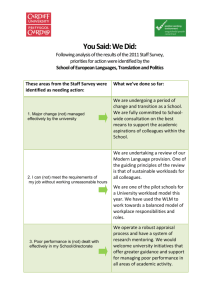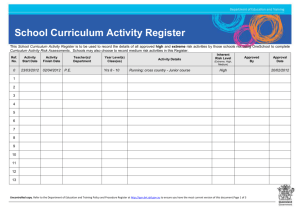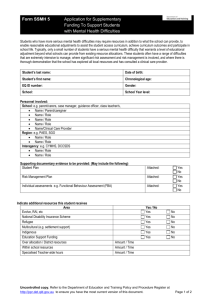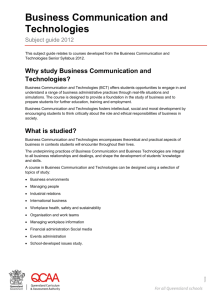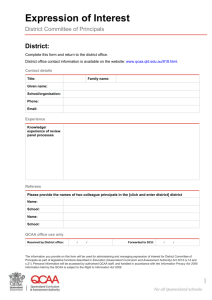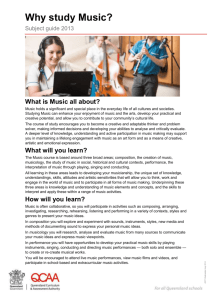Scope of Development Options - Policy and Procedure Register
advertisement
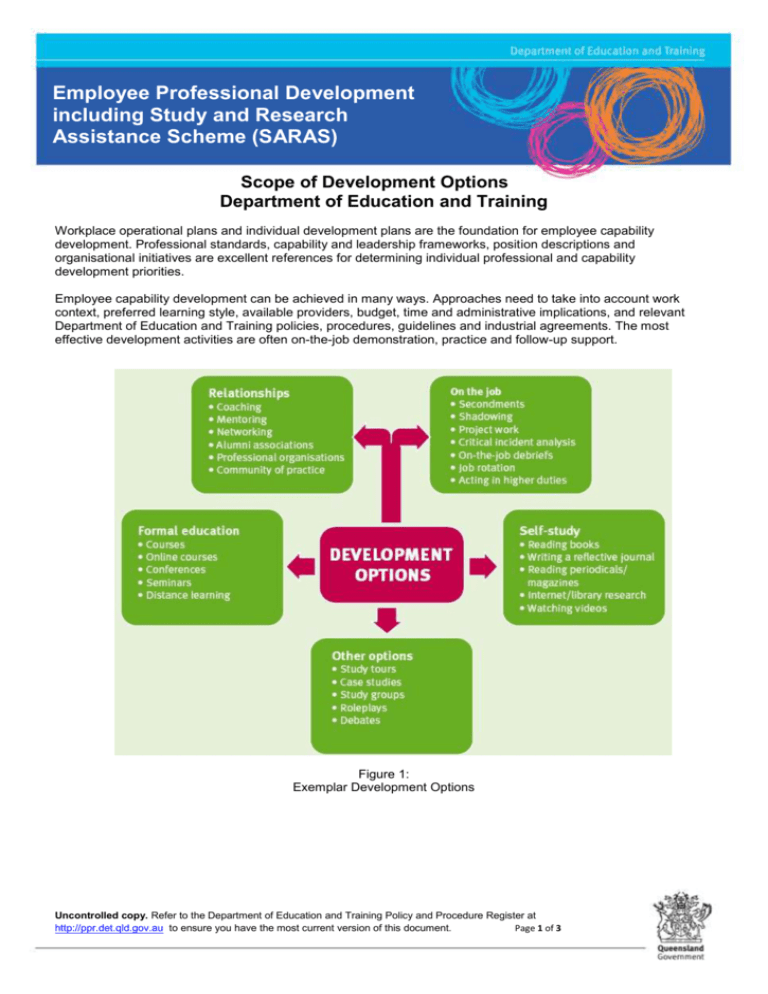
Employee Professional Development including Study and Research Assistance Scheme (SARAS) Scope of Development Options Department of Education and Training Workplace operational plans and individual development plans are the foundation for employee capability development. Professional standards, capability and leadership frameworks, position descriptions and organisational initiatives are excellent references for determining individual professional and capability development priorities. Employee capability development can be achieved in many ways. Approaches need to take into account work context, preferred learning style, available providers, budget, time and administrative implications, and relevant Department of Education and Training policies, procedures, guidelines and industrial agreements. The most effective development activities are often on-the-job demonstration, practice and follow-up support. Figure 1: Exemplar Development Options Uncontrolled copy. Refer to the Department of Education and Training Policy and Procedure Register at http://ppr.det.qld.gov.au to ensure you have the most current version of this document. Page 1 of 3 Professional Practice Professional practice may include: participating in formal professional learning events, such as seminars, conferences, case studies, study groups and workshops participating in vocational education and training related activities - including release to industry (refer to Teacher Placement in Industry procedure - school teachers) undertaking tertiary qualifications, online courses, short courses, distance learning undertaking industry placement and vocational education and training accreditation programs networking with colleagues, other professionals, advisors and supervisors conducting research/action learning projects/collaborative enquiries developing quality teaching and learning resources and assessment tools developing courses and/or qualifications delivering courses and/or workshops undertaking higher education programs in professional speciality areas Leadership Specific leadership, professional and teaching capability development options include: contributing as a writer or editor to professional journals and relevant publications developing policy and/or managing implementation of policy accepting formal representative positions on professional bodies or their subcommittees - e.g. boards of study and registration boards, industry skills councils and working groups accepting leadership positions in a professional association or network planning, organising, delivering and evaluating a professional development program or activity presenting research findings to colleagues at seminars, conferences or workshops trialling new initiatives individually and/or with colleagues undertaking formal leadership and management development programs and activities managing change within the workplace undertaking secondments, job rotation, higher duties or relieving opportunities involvement in forums, advisory councils and consultative reference groups Involvement in school and work unit management meetings - e.g. budgeting, staffing, capability development planning, participation in collaborative reviews, Teaching and Learning audits involvement in curriculum and policy development activities writing of work programs - e.g. Queensland Curriculum and Assessment Authority (QCAA) coaching others and being coached by another leader mentoring others or being mentored by another leader Registered teachers The following list of professional development activities for registered teachers is based on the Queensland College of Teachers Continuing Professional Development (QCT CPD) Framework. QCT CPD for Registered Teachers includes: active contribution to education system initiatives, pilots, trials and projects courses, workshops (including school-based), conferences, vacation schools or online courses relevant to teaching context syllabus, curriculum and assessment professional development conducted by QCAA or employer training for and development from participation in national and state test marking, QCAA and school-based teacher consistency of judgment procedures formal presentations to colleagues on classroom practices, research findings or contemporary issues in education leading school-based curriculum and/or policy development preparation for and development through providing collegial professional support for pre-service or beginning teachers as part of supervising/mentoring role educational research/action research projects Uncontrolled copy. Refer to the Department of Education and Training Policy and Procedure Register at http://ppr.det.qld.gov.au to ensure you have the most current version of this document. Page 2 of 3 active involvement in approved overseas teacher exchange, encompassing pre-preparation, on-site professional development and subsequent reporting professional reading linked to activities such as research, preparation of articles, presentations to colleagues and professional practice formal study leading to a higher qualification in education or field related to teaching area Effective development opportunities for all employees The list of activities below is indicative of the wide range of development options available for all employees that can often be undertaken on-the-job. Employees may be involved in: discussions or learning circles working with, or as, a mentor or coach working in a different role at level challenges that stretch a person acting in higher duties collecting, interpreting and applying feedback from stakeholders observing exemplary practice work shadowing or working on a project with a mentor or supervisor reflecting on and evaluating personal practice to improve outcomes self-assessment using the Capability and Leadership Framework active participation in individual and team development planning conducting research/action learning projects/collaborative enquiries reading departmental, government and professional publications writing business documents, e.g. briefs, letters, project/lesson plans, accounts, reports participating in recruitment and selection activities including panel interviews collaborative planning, implementation and evaluation problem solving participating in on-the-job debriefs developing resources peer observation and review, e.g. as a critical friend sharing best practice with groups of colleagues working in inter-agency/inter-facility teams or on committees active membership of a professional association, working group, community of practice or network active involvement in relevant public activities Additional forms of employee professional development may include: enrolment in formal learning programs online learning reading participation in workshops as a participant or as a leader involvement in committees and reference groups identifying improvements to work practices, implementing and evaluating them Uncontrolled copy. Refer to the Department of Education and Training Policy and Procedure Register at http://ppr.det.qld.gov.au to ensure you have the most current version of this document. Page 3 of 3
